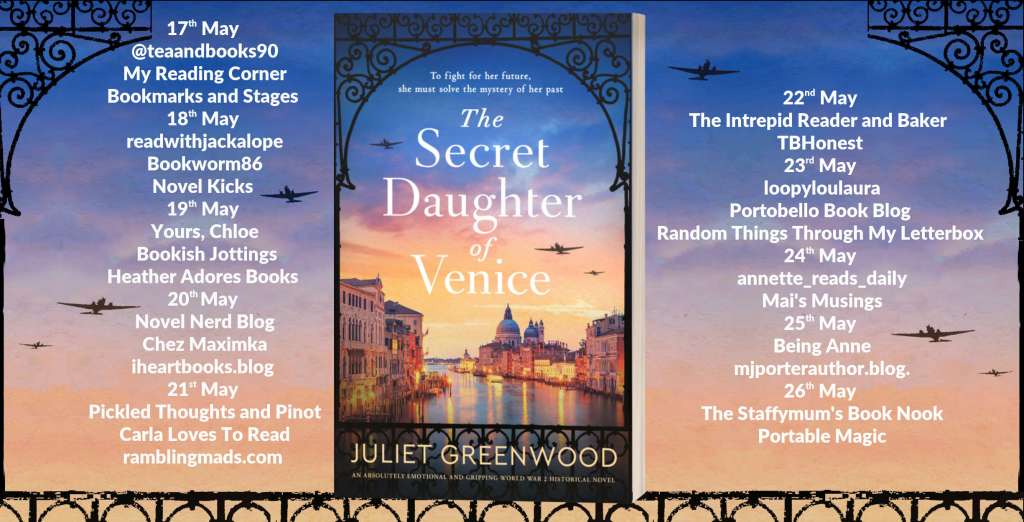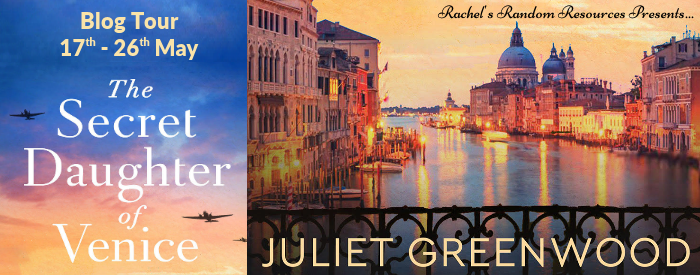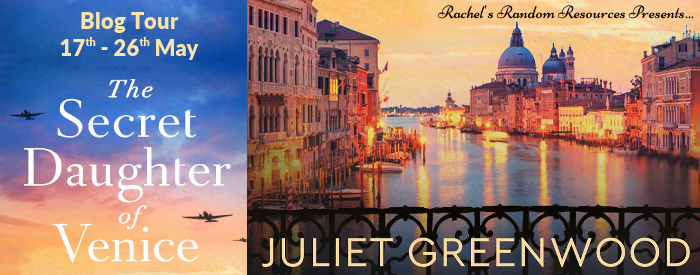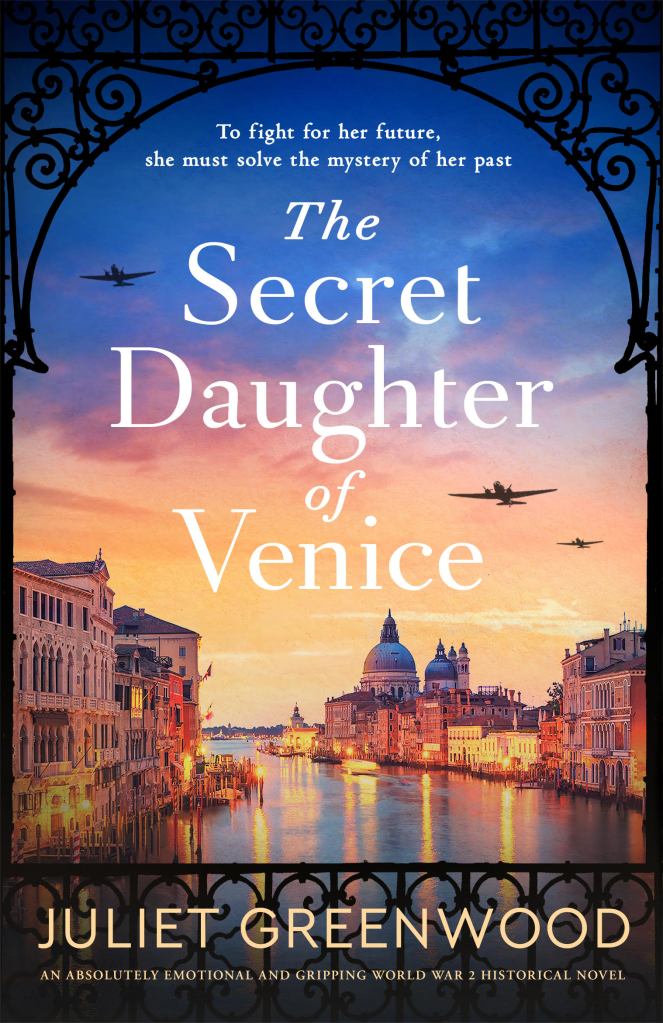I’m delighted to be sharing a guest post by Juliet Greenwood about how she researched the historical elements of her new book, The Secret Daughter of Venice.
Researching the experience of women in WW2
I found the hardest part of my research for The Secret Daughter of Venice, as with all my books, was finding events described from the point of view of the women who survived WW2, both in the UK and in Europe. There is getting to be more information now about ‘ordinary’ people, as well as the soldiers, the generals, the heads of state and the politicians who have always been at the centre of the story, but it is still difficult to find first-hand accounts and to really gauge how people lived, how they thought, how they survived.
I can remember as a child instinctively noticing the difference, without being able to put it into words, between the films about the war that generally focused on the heroics of battles, while at the same time hearing my parents and their generation re-living their experiences of everyday life under the shadow of shortages, of the possibility of death at any moment and the fear of what would happen should the UK be invaded. What I remember from the French side of the family, along with my teachers who had arrived in the UK as refugees from France and Germany, is the silence. I think, even then, I understood that all they had lived through, and were still living with, such as family lost in the gas chambers and memories of the firestorm in Hamburg, were too traumatic to express.
That was when I began to feel that I wanted to know more about the invisible, every day, experience of war. That’s not to say that the experience of those fighting evil in any way they could, or surviving the obscenity of concentration camps, is any less vital. It’s just that those have the information readily, and have been written about at length, while the women and children still remain largely silent.
The research I found most challenging involved the experience of women, and children and civilians in Europe during the war. Kate, the heroine of The Secret Daughter of Venice, experiences the war largely in Cornwall where, despite the shortages and the fear, and the anxiety for those at the front, life is ordered and purposeful, focused on growing food and looking after orphaned children in a place safe from the bombing of UK cities. It is only after the war has ended that she sees the utter destruction in Naples, the traumatised children left alone and fending for themselves, vulnerable to anyone wishing to prey on the desperate. Sofia, the second main character in the book, survives the war in Venice, where there is not the physical destruction experienced in the surrounding countryside, but the fear, along with shortages and hardship, seep into all parts of life, particularly once the Italians overthrow the fascist Mussolini and join the allies in the fight against Hitler, leading to Venice being occupied by the German army.
Like with my previous novel for Storm, The Last Train from Paris, I tried to glean from snippets of information what it must have been like to live through such terrifying times. How do you live when your country has been invaded by an alien force, when your existence, and those of your children, is meaningless, to be snuffed out on a whim? The Europe left after WW2 was very similar to the utter destruction we now see on our TV screens, with cities decimated, leaving no housing, no hospitals, no way of making a living, and, even if you have money, no food to buy, not even safe water to drink? I can see why reporters focus on the horrors, but we still have relatively little information of the quiet heroism of surviving day to day, when all the benefits of modern life have been stripped away.
I did find some first-hand accounts that gave me clues, including local newspapers and the oral histories contained in the BBC’s WW2 People’s War. But, in the end, I found myself going back to my memories of those I had heard talk – or not speak at all – of living through such times to try and get under the skin of what it must have been like. I can just hope that, in some measure, it helps to break the silence.
Thank you so much for sharing.
Here’s the blurb
The paper is stiff and brittle with age as Kate unfolds it with trembling hands. She gasps at the pencil sketch of a rippling waterway, lined by tall buildings, curving towards the dome of a cathedral. She feels a connection deep in her heart. Venice.
England, 1941. When Kate Arden discovers a secret stash of drawings hidden in the pages of an old volume of poetry given to her as a baby, her breath catches. All her life, she has felt like an outsider in her aristocratic adoptive family, who refuse to answer any questions about her past. But the drawings spark a forgotten memory: a long journey by boat… warm arms that held her tight, and then let go.
Could these pictures unlock the secret of who she is? Why her mother left her? With war raging around the continent, she will brave everything to find out…
A gripping, emotional historical novel of love and art that will captivate fans of The Venice Sketchbook, The Woman on the Bridge and The Nightingale.
Purchase Links
https://www.amazon.co.uk/Secret-Daughter-Venice-absolutely-historical-ebook/dp/B0CVV7F4N7
https://www.amazon.com/Secret-Daughter-Venice-absolutely-historical-ebook/dp/B0CVV7F4N7
Meet the author
Juliet Greenwood is a historical novelist published by Storm Publishing. Her previous novel, The Last Train from Paris, was published to rave reviews and reached the top 100 kindle chart in the USA. She has long been inspired by the histories of the women in her family, and in particular with how strong-minded and independent women have overcome the limitations imposed on them by the constraints of their time, and the way generations of women hold families and communities together in times of crisis, including during WW2.
After graduating in English from Lancaster University and Kings College, London, Juliet worked on a variety of jobs to support her ambition to be a full-time writer. These ranged from running a craft stall at Covent Garden to running a small charity working with disadvantaged children, and collecting oral histories of traditional villages before they are lost forever. She finally achieved her dream of becoming a published author following a debilitating viral illness, with her first novel being a finalist for The People’s Book Prize and her first two novels reaching #4 and #5 in the UK Kindle store.
Juliet now lives in a traditional quarryman’s cottage in Snowdonia, North Wales, set between the mountains and the sea, with an overgrown garden (good for insects!) and a surprisingly successful grapevine. She can be found dog walking in all weathers working on the plot for her next novel, camera to hand.
Connect with the author
Storm: https://stormpublishing.co/
Website: http://www.julietgreenwood.co.uk/
Blog: http://julietgreenwoodauthor.wordpress.com/
Facebook: https://www.facebook.com/juliet.greenwood
Twitter: https://twitter.com/julietgreenwood
Instagram: https://www.instagram.com/julietgreenwood/
BlueSky https://bsky.app/profile/julietgreenwood.bsky.social
Giveaway to Win 3 x Signed copies of The Secret Daughter of Venice (Open to UK Only)
http://www.rafflecopter.com/rafl/display/33c69494587/?
*Terms and Conditions –UK entries welcome. Please enter using the Rafflecopter box below. The winner will be selected at random via Rafflecopter from all valid entries and will be notified by Twitter and/or email. If no response is received within 7 days then Rachel’s Random Resources reserves the right to select an alternative winner. Open to all entrants aged 18 or over. Any personal data given as part of the competition entry is used for this purpose only and will not be shared with third parties, with the exception of the winners’ information. This will passed to the giveaway organiser and used only for fulfilment of the prize, after which time Rachel’s Random Resources will delete the data. I am not responsible for despatch or delivery of the prize.





